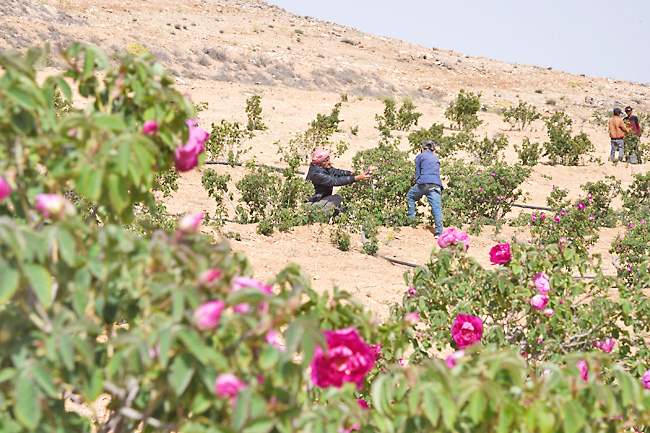DAMASCUS (XINHUA) – At a mountainside in the Al-Marah town north of Syrian capital Damascus, bushes of the famous Damascene Rose sway with the wind, withstanding all weather conditions and actual battles, but are now threatened by United States (US) sanctions.
The Al-Marah town is believed to be the original hometown of the world-famous Damascene Rose in the foothills of the Qalamoun mountains north of Damascus, whose history goes back to the time when the Romans were said to have brought the rose to England from this region.
In the first two years of the Syrian crisis, the pink double flower, which was regarded as a national product of Syria, missed those who used to take care of it, as the fields of roses in Al-Marah became a sort of military zones for the army to hunt down rebels in the nearby towns.
After the Qalamoun liberation, farmers were once optimistic about salvaging the rose and carrying on their fathers’ legacy. However, the US sanctions had a longer-lasting negative impact on the Damascene Rose, renowned for its special fragrance and heady-scented oil, as one gramme of its oil was said to be sold in the US for as high as USD60.
Sixty-year-old rose farmer from Al-Marah Muhammad Jamal Abbas told Xinhua the weather condition this year was bad with no considerable rainfall or snow in their town.

Add to that, he continued, the US sanctions have deprived the farmers of exporting the extracted oil, creams, and other products that derive from the rose. “The foreign merchants who used to buy our products have stopped purchasing them due to the sanctions. Now, we only rely on local markets to sell our products, but the demand is so little,” he said.
Furthermore, the US sanctions also prevented the Syrian farmers from having new machines to help process the various products of the rose.
Near his farm, Abbas has a big venue, where some makeshift machinery and old-styled devices are located to press the rose and extract the oil and water out of it.
The venue looks like a time capsule, taking visitors back in history to see the original machinery and equipment.
“I don’t know where we are going. We are extremely affected by the US sanctions, and the impact is not little,” he stressed.
Abbas further warned that the profession of making products out of the Damascene Rose could come to an end as nowadays farmers are working without any profit, only losses.
Abbas hoped the Damascene Rose would regain its glamour and glory days, and the US sanctions would be lifted soon so that he and other Syrian farmers could have access to foreign markets.
“The Damascene Rose is a beautiful plant,” he said.







